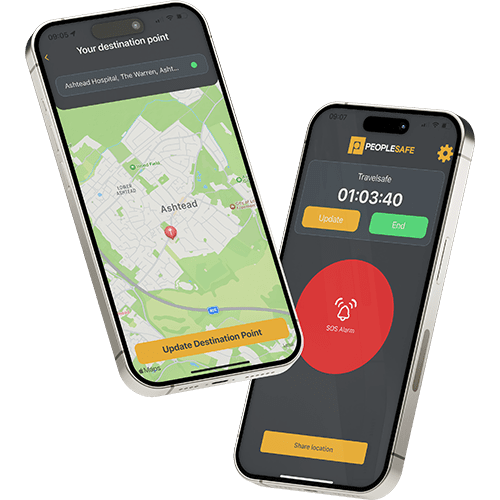How Far Does Duty of Care Extend?
Navigating your legal and ethical responsibilities as an employer can be challenging. While the concept of ‘duty of care’ serves as guidance for the relationship between employers and employees, there is no definitive outline on what this covers.
Traditionally linked with safeguarding employees during on-site work, the evolving landscape of remote and hybrid working has stretched the boundaries of where is considered ‘work’ and therefore raised questions about where this duty ends.
What is Duty of Care?
Duty of care is the legal and ethical responsibility of ensuring the safety and wellbeing of others.
For employers, this means taking all reasonable precautions to safeguard the health, safety and wellbeing of staff, anyone working on behalf of your organisation, or anyone impacted by your operations (e.g. customers or the general public). Irrespective of your organisation’s size, all employers hold a duty of care.
This duty extends to business-related travel, requiring employers to prevent harm to employees while acting in the course of employment, whether this be travelling to and from meetings, conferences, or other work-related commitments.
Failure to fulfil your duty of care can lead to consequences such as the loss of talent, fines, and, in extreme cases, business closure. Importantly, employers cannot delegate this duty, emphasising their direct responsibility for the safety and wellbeing of employees.
Legal Framework
There is no specific regulation or legislation referring to duty of care; instead, it has been established through case law claims of negligence. In order to fulfil their legal responsibilities, employers must abide by relevant health & safety and employment law, as well as the additional measures imposed by the duty of care common law.
This means that if the failure to conduct a risk assessment and implement necessary measures led to the harm of an individual, the organisation could be liable for breaches of the Health and Safety at Work Act, and gross negligence relating to a personal injury case.
Although employers do not have to provide a workplace completely free from risk, they can be prosecuted if they do not implement all seemingly reasonable measures to keep the affected safe from harm.

The Commute
Officially, a worker’s commute is not covered by an employer’s duty of care. However, situations may arise where the journey to work poses a perceived serious and imminent danger to the employee.
Under Section 44 of the Employment Rights Act 1996, if employees have ‘reasonable belief’ they will experience dangerous conditions on their commute, they could approach their employer with a request for alternative arrangements. This could include working from home or taxis being funded to avoid having to use public transport or walk home in the dark.
If these employees face dismissal or are denied pay for refusing to work in what they perceive as dangerous commuting conditions, they hold the right to bring legal claims against their employer for unfair dismissal or unlawful detriment. This could result in expensive fines, but can also damage your organisation’s reputation, having subsequent effects on recruitment, retention and employee productivity.
The Moral Argument
While the legal framework establishes a workplace duty of care, morals extend the reach of responsibility to areas beyond the traditional work environment.
Organisations at the forefront of safety and wellbeing believe that extending their duty of care is a critical part of being a responsible employer. Adopting this view and taking action to support it reinforces the view that employees are whole individuals who deserve support beyond the workplace.
Forward-thinking employers recognise the ethical principles of protecting employees beyond the legal minimum, but also see the clear benefits that ensuring employee safety can have on employee satisfaction, namely retention, productivity, and overall organisational success.
Duty of care while commuting was highlighted by a high-profile incident in Glasgow involving a female hotel worker who was sexually assaulted after a Friday night shift while awaiting a taxi for her journey home. Significantly, this occurred after her employer ended a policy of paying towards taxi fares for their staff when they finished work. Unite the Union responded to this employer stating that they failed to ‘provide an adequate duty of care’ and ‘support late-night travel after public transport hours’.
Case Study: Baker v. Royal Mail plc (2018)
In a 2018 case, Richard Baker worked as a postman for Royal Mail and often experienced fatigue due to long hours and demanding delivery routes. Despite notifying his supervisor about his fatigue, he wasn’t offered alternative options or given sufficient rest breaks. While cycling home after a shift, Mr Baker fell asleep at the wheel and collided with a car, sustaining serious injuries.
Mr Baker argued that the employer was aware of his fatigue and associated risks but failed to take reasonable steps to mitigate them. This included not adjusting workloads, offering alternative travel options, or providing adequate rest breaks, directly contributing to his accident and injuries.
The court partially sided with Mr Baker, acknowledging Royal Mail’s duty of care even during employee commutes. They noted the employer’s failure to adequately address the known risk of fatigue and implement preventive measures.
Case Study: Taylor v. Network Rail (2017)
In the case of Taylor v. Network Rail, Ms Taylor, a train conductor, raised concerns about her safety during late shifts due to walking through a poorly lit and isolated access route. Despite expressing her worries to Network Rail about potential risks like mugging or assault, the company took no action to enhance the safety of the route.
In her legal action, Ms Taylor argued that Network Rail was aware of the foreseeable risks associated with the unsafe access route and failed to take reasonable steps to mitigate them, such as improving lighting, installing security cameras, or offering alternative travel options for late-night staff.
The court sided with Ms Taylor, recognising that Network Rail breached its duty of care by neglecting to address the known safety risks of the access route. The court affirmed that employers have a responsibility to ensure the safety of their employees, even during commuting periods related to work demands. Ms Taylor was awarded compensation for the emotional distress and potential risks she experienced due to the unsafe commute.
Addressing Your Duty of Care
Despite the existence of duty of care in case law, there are no exact outlines of what measures employers must take to fulfil this. Instead, employers must take reasonable and practical steps to ensure the health, safety, and wellbeing of their employees during the course of their employment, including ensuring that they feel safe.
To do this, employers must listen to the individual concerns of employees and collaborate with them to address these worries where possible.
In our research, we found that 60% of people are concerned about commuting on public transport during unsociable hours and 51% of employees agree that employers have a duty of care towards them outside of working hours.
To address this, innovative companies are taking strides to address these concerns and fulfil employee expectations by implementing measures to enhance the safety of the commute. Whether it’s providing transportation options, supporting remote work to minimise commuting time or offering safety solutions for employees during their travels, these initiatives showcase a commitment to a broader duty of care.
When asked if they would take up the offer of a subscription, two in three employees agreed they would be likely or certain to and 48% of employees surveyed said that they would see their employer in a better light if offered Peoplesafe’s personal protection solution. This shows the positive impact that simple proactive safety measures can have on employee’s safety and wellbeing.
Employee Safety Solutions
Employee safety solutions such as personal safety apps and personal safety devices by Peoplesafe, play a pivotal role in helping employers to fulfil their duty of care, both inside and outside of work. With Peoplesafe, employees gain access to a personal safety device or app that provides an immediate connection to our alarm receiving centre.
At the press of a button, users can raise an alarm, opening a two-way communication channel with an expertly trained controller who will triage the call and coordinate the most appropriate response, bypassing 999 for the fastest response possible when necessary. This immediate response provides employees with peace of mind that help will be available wherever and whenever they need it.
Additional features such as Travelsafe can provide employees with enhanced support on every journey. Users simply need to set their location and destination, then the app will calculate how long the journey should take and an estimated arrival time. If they don’t reach their destination by the estimated arrival time an alarm will automatically be raised to our 24/7 control centre.
Peoplesafe is available round-the-clock, meaning that employees can access the service whenever they need it, no matter if they are working, commuting, socialising or exercising. This serves as an additional perk and demonstrates to employees that their welfare is valued.
See how Travelsafe works:








